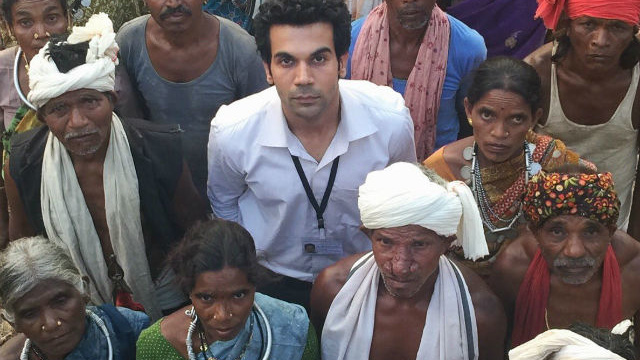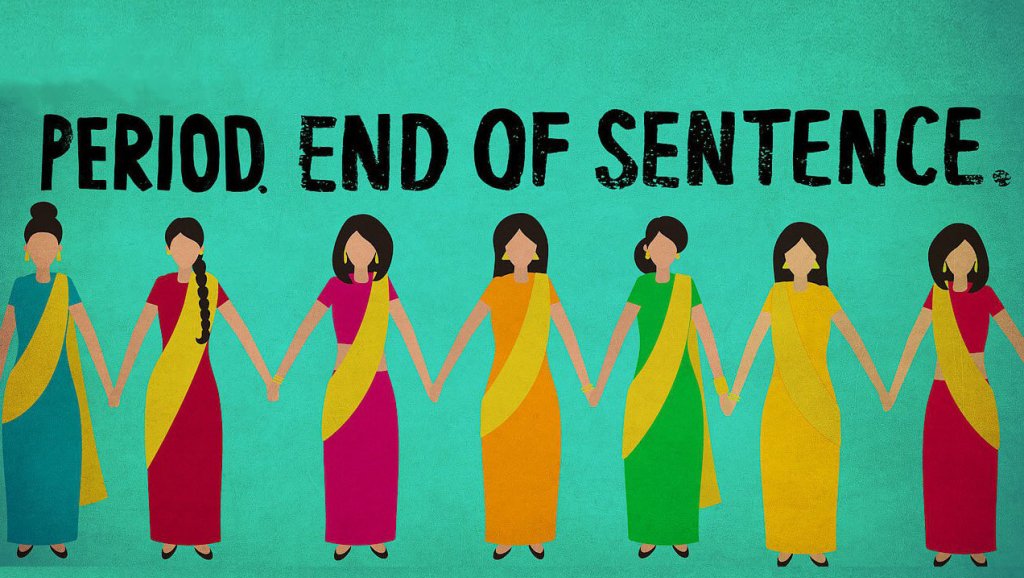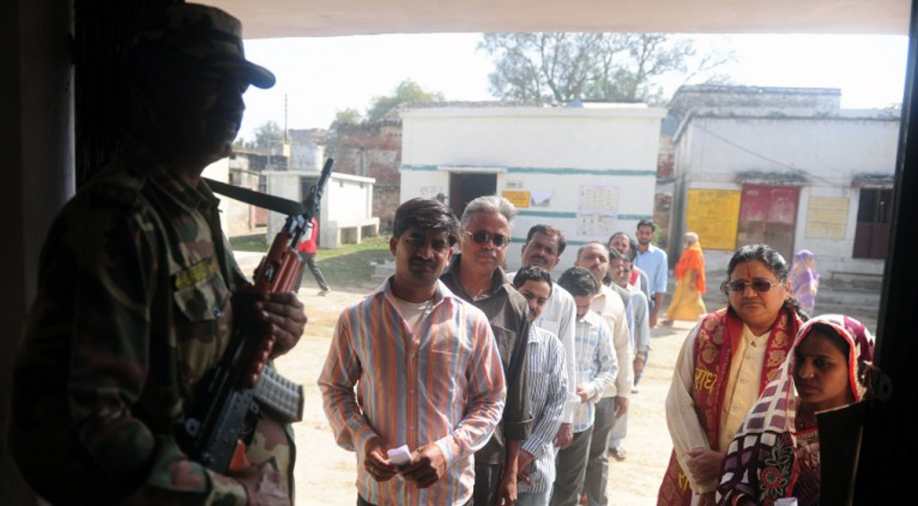A film like Newton is a significant departure from the fairy tales of popular cinema as it allows an unconventional and even controversial theme to be debated upon. The film’s realistic appeal and ability to generate dialogue is a welcome step in the trends of popular cinema but is it enough to transform commonsensical perceptions about conflict, violence and injustice?
Aishwarya Chowdhary | The New Leam

Indian Cinema has grown significantly over the last couple of years especially as we see a shifting trend in commercial cinema. Commercial cinema which earlier adhered to the typical formula for success and box-office returns has now gradually started taking up themes that were earlier beyond its domain and were in significant ways limited to art cinema. The taste of the viewers too it seems has shifted from unreal and dream-like stories and locations to stories that are more realistic and relatable. This can be said at least of a significant population if not of the masses. Themes that had once seemed to be completely off the radar and of insignificant interest to both cinema makers and cinema watchers are now beginning to get a new recognition in the world of cinema. What is worth pointing out here is also how today it is not being seen as the sole responsibility of art cinema to comment on themes of social relevance but how even commercial cinema is opening out itself to the colours of experimentation. We have seen the success of movies that were made on alternative themes like The Lunchbox, Parched, Nil Battey Sannata, Aligarh, Masaan and many others in recent times which goes on to establish the fact that even if it is gradual the audience today is gradually building up its appetite for quality cinema on realistic and socio-cultural issues.
India’s official Oscar entry this year, Newton is a film of this kind. The film has been directed by Amit V Masukar. This is a story about the functioning of democracy at the grassroots. The film stars many well acclaimed actors like Rajkumar Rao( Newton Kumar-the protagonist), Pankaj Tripath, Raghubir Yadav, Sanjay Mishra and Anjali Patil. All the actors fit in their respective roles marvellously and the right blend of cinematographic excellence and quality acting make this a fine film. Apart from the few shots in the city, the film is entirely shot in the Jungles of Chhattisgarh which further adds to its realistic appeal and popular relatability.
Newton narrates the story of polling on a booth for Lok Sabha election in a remote area of Chhattisgarh with 76 eligible voters. Newton (Rajkumar Rao), who is a government clerk, is appointed as the presiding officer for the booth. He is accompanied by Loknath (Raghubir Yadav) as second in charge and Malko Netam (Anjali Patil) who is a local teacher and has been appointed as the election officer of the local area. Aatma Singh who is the local security officer is responsible for ensuring the safety of the booth and the in-charges. A school in a burnt down village is chosen to be the election booth and voters from two neighbouring villages are to cast their vote at the booth.

The film is about Newton’s struggle to get this polling done according to the protocol and to ensure a free and fair election at the polling booth. It shows how against all the odds he successfully completes the polling process. The film comes with a simple message “Jab tak kuch nahi badloge, tab tak kuch nahi badelgea”. Newton goes to the village not with the intention to reverse or transform the situation but merely to do his job with honesty and allow the villagers to exercise their right to franchise.
However, the story that the film tells is bigger than this election polling. It tells the story of villagers living in an area of insurgency and their relationship with the security officials. The story is situated in a village that lies in a remote area of Chhattisgarh lying on the Red-belt. It shows the mechanism of power-relations in the area and how the tribal are exploited by local state agents. It does not show any outright act of physical violence or any armed action subjected to the villagers but shows petty ways of everyday exploitation and the exercise of unjust power by state officers. The film shows the real picture of the reach of the “largest democracy”. It shows how the boundaries of the largest democracy fall short when it comes to reaching the interiors of remote areas. It brings forth the unknown and unimaginable realities of the remote areas that are caught in insurgency and that are security sensitive. The film shows how the larger politics is unaware of the concerns of the ground; and how the issues of the ground concerns like the exchange price of tendu patta( a local crop) are unrelatable with the issues of the larger politics.
The film narrates the story of the state versus the Maoists, however it only shows state agents and the opposition is not directly presented. Maoists are referred to only in conversations and jokes by the state agents. The narration is therefore about the State and its antagonist approach towards the Maoists and the ordinary villagers who are caught in in this situation. However, even when we see the state agents as exploiters, we are not made to hate them but are only enabled to see them as individuals fulfilling their positional roles. The essence of this is can be understood in Aatma Singh’s dialouge “aapki humari koi personal dushmani to hai nahi“(after all you and I have no personal issues). We get to know Aatma Singh as a character and not merely as a person in position and therefore, even when we know that his positional acts are not justified, we do not hate him because of his likeable and relatable character. The other characters too are so real and believable. Loknath represents everyone within the system who is indifferent to the non-functionality of the system. The character is relatable as he could be any other clerk at a lethargic government office. Malko Netam’s character, who is a Gondi local and a local teacher appointed as election in-charge at the booth, is not as optimistic as Newton; neither is he as cynical as Aatma Singh and is not even in-different like Loknath but is practical and is aware of the ground reality as she has lived in it. She hopes for change but knows that significant change takes time and does not come about overnight and says “Saalo lag jaate hain jungle banne me”.
The tribal villagers are also so believable and not romanticised in any manner. The depiction of the villagers, the structure of their houses, and livelihood centred on tendu patta shows that the film is a well researched work and is true to reality.
Newton’s character is shown as an honest officer and this trait of his character is emphasised upon at numerous junctures in the film. He refuses to forge the election polling at the cost of his security, he refuses to marry a girl who is not legally eligible, and he takes extra effort to successfully get the polling done. His motive is to perform his duty righteously. His heroic character is maintained throughout the film. The effort that he puts into making the polling possible shows his fearless character but his effort is normalised by the end of the film when he says “9 baje office aane ka time hai main 9 baje aa jata hoon, logo ko lagta hai bahut badi baat hai to award de diya“(one is required to come to office at 9 am and I do just that, yet people think it’s a big deal and so they gave me an award!).This normalises his honesty and therefore gives a message that ‘Imaandari’(honesty) is not something unusual or extraordinarily heroic or beyond the capacity of common people.
The film reflects upon a situation that is critical, saddening and it also manages to raise some concerns however without once painting a pessimistic picture. The film does not make one feel the burden of a heavy narration even while telling a serious story. The dialogues and humorous one-liners lighten the mood of the film even while maintaining the heavy storyline. An important and intricate narration is skilfully narrated with humour. This makes one understand the context without even feeling the burden of it. Through this humorous narration of a critical story, the film raises certain concerns and questions but it does not claim to provide any solutions to it. However, what the film really does is that it brings a possibility of conversation that has been missing from the popular culture. It initiates a possibility of having an open dialogue about the exploitation of the innocent at the hands of state agents and security officials in sensitive areas in the name of security and “duty”. Only meaningful attempts like this film and not aggressive debates can make it possible to initiate an egalitarian and inclusive dialogue and bring some perspective in the larger society about the reality of the situation.
This article is published in The New Leam, OCTOBER 2017 Issue( Vol .3 No.29) and available in print version. To buy contact us or write at thenewleam@gmail.com













